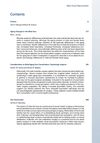 August 2024 in “OSMANGAZİ JOURNAL OF MEDICINE”
August 2024 in “OSMANGAZİ JOURNAL OF MEDICINE” The visfatin GT genotype may increase the risk of Alopecia Areata.
 July 2008 in “Facial Plastic Surgery Clinics of North America”
July 2008 in “Facial Plastic Surgery Clinics of North America” Men's facial rejuvenation involves unique challenges and is increasingly popular, with many opting for nonsurgical treatments.

Celiac disease requires more than just a gluten-free diet for effective management.
 27 citations,
March 2018 in “Allergy and asthma proceedings”
27 citations,
March 2018 in “Allergy and asthma proceedings” People with alopecia areata often have higher rates of allergies and autoimmune diseases.
 4 citations,
November 2021 in “Pharmaceuticals”
4 citations,
November 2021 in “Pharmaceuticals” Paeonia lactiflora and Poria cocos extracts can potentially increase hair growth and reduce hair loss symptoms by lowering testosterone and inflammation levels.
 24 citations,
May 2018 in “Journal of Molecular Endocrinology”
24 citations,
May 2018 in “Journal of Molecular Endocrinology” The spiny mouse is a unique menstruating rodent that can help us understand menstruation and reproductive disorders.
 60 citations,
September 2015 in “Expert Review of Clinical Immunology”
60 citations,
September 2015 in “Expert Review of Clinical Immunology” Lymphocytes, especially CD8+ T cells, play a key role in causing alopecia areata, and targeting them may lead to new treatments.
 November 2024 in “Journal of Cosmetic Dermatology”
November 2024 in “Journal of Cosmetic Dermatology” Regenerative medicine is effective and safe for treating vitiligo.
 August 2024 in “Nutrition Bulletin”
August 2024 in “Nutrition Bulletin” GLP-1 receptor agonists help with weight loss but need to be combined with other treatments for best results.
 15 citations,
September 2021 in “Archives of Plastic Surgery”
15 citations,
September 2021 in “Archives of Plastic Surgery” The document concludes that facial feminization surgery improves psychological well-being and social acceptance for transgender individuals.
 April 2018 in “Routledge eBooks”
April 2018 in “Routledge eBooks” Gender identity can be more diverse than just male or female.

research Acne
4 citations,
January 2019 Acne is a common skin condition that can be influenced by diet, lifestyle, and hormones, and requires a treatment approach that includes psychological considerations.
6 citations,
September 2023 in “International journal of molecular sciences” Oxidative stress worsens PCOS by damaging cells and disrupting metabolism, suggesting antioxidant treatments might help.
 2 citations,
January 2023 in “Journal of Clinical Medicine”
2 citations,
January 2023 in “Journal of Clinical Medicine” People with hair loss conditions may also have thyroid disorders, but more research is needed to understand the connection.
 6 citations,
May 2022 in “Frontiers in Medicine”
6 citations,
May 2022 in “Frontiers in Medicine” The study suggests pandemic stress might worsen or trigger hair loss problems.
 8 citations,
October 2018 in “Journal of Investigative Dermatology”
8 citations,
October 2018 in “Journal of Investigative Dermatology” Many patients with Alopecia Areata in Korea experience anxiety, depression, and reduced quality of life, which are often unrelated to the severity of hair loss.
 March 2017 in “InTech eBooks”
March 2017 in “InTech eBooks” Acne vulgaris is a common skin condition that can cause low self-esteem and depression, and early treatment is important to prevent scarring.
 5 citations,
January 2017 in “Clinics in Dermatology”
5 citations,
January 2017 in “Clinics in Dermatology” Skin symptoms without a medical cause often reflect psychological stress and are influenced by culture, requiring a team approach for treatment.
 21 citations,
April 2015 in “Psychology Research and Behavior Management”
21 citations,
April 2015 in “Psychology Research and Behavior Management” Cognitive-behavioral therapy is the best treatment for hair-pulling disorder, and combining it with other therapies could improve results.
 2 citations,
July 2022 in “International Journal of Women's Dermatology”
2 citations,
July 2022 in “International Journal of Women's Dermatology” U.S. dermatology residents need more education and experience with LGBT patients to improve their cultural competency.
 April 2024 in “Archiv EuroMedica”
April 2024 in “Archiv EuroMedica” Platelet-Rich Plasma therapy helps increase hair density and regrowth for some types of hair loss.
 66 citations,
December 2003 in “Endocrinology and Metabolism Clinics of North America”
66 citations,
December 2003 in “Endocrinology and Metabolism Clinics of North America” Doctors need to be better prepared to assess and treat obesity in patients.
20 citations,
August 2015 in “Behaviour change” Cognitions significantly influence Trichotillomania, suggesting cognitive therapies could help.
114 citations,
March 2010 in “Zebrafish” PROTO1 and PROTO2 protect against hearing damage.
 June 2023 in “Journal of multidisciplinary sciences”
June 2023 in “Journal of multidisciplinary sciences” PCOS may increase the risk of certain cancers.
 69 citations,
April 2017 in “BMJ open”
69 citations,
April 2017 in “BMJ open” Many people with alopecia experience high levels of social anxiety, anxiety, and depression, and while wigs can boost confidence, they may also cause anxiety.
 October 2023 in “The Cochrane library”
October 2023 in “The Cochrane library” The medicine baricitinib was found to notably improve hair regrowth in alopecia areata, but more research is needed on its side effects and other treatments.
 14 citations,
November 2016 in “Annals of Internal Medicine”
14 citations,
November 2016 in “Annals of Internal Medicine” Tofacitinib, an arthritis drug, helped hair growth in alopecia universalis but long-term safety needs more research.
 18 citations,
March 2017 in “International clinical psychopharmacology”
18 citations,
March 2017 in “International clinical psychopharmacology” Inositol was not more effective than a placebo in treating trichotillomania.
 June 2023 in “Dermatology and therapy”
June 2023 in “Dermatology and therapy” The Middle East and Africa need better data, treatment consensus, and support for Alopecia Areata.



























